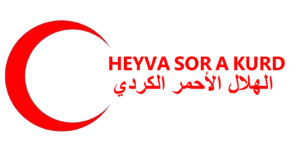The Kurdish Red Crescent concluded a month full of activity and awareness campaigns.
Cancer patients in Sweida face life-threatening difficulties. Due to the bloody events and the siege imposed on the region, they cannot travel to Damascus or any centers outside Sweida to continue their treatment or receive their medication doses at the few specialized centers. This is also due to the shortage of medicines inside Sweida due to the siege. We at the Kurdish Red Crescent have coordinated with several organizations inside and outside Sweida to secure the necessary medicines, chemotherapy doses, and healthcare for this group, considered the most affected by the violence and siege. We wish them a speedy recovery.
In response to the needs of local residents, and in coordination with the Directorate of Water and the Municipality of Qamishlo, the Kurdish Red Crescent, with the support of Àrea Metropolitana de Barcelona (AMB), implemented the “Emergency Water Response” project.
As part of this initiative, two wells were drilled in the neighborhoods of (Alaya and Hilaliya) and equipped with submersible pumps powered by solar energy.
Each well was connected to a main water tank with a capacity of 5,000 liters, which in turn supplies a distribution system consisting of three secondary tanks (2,000 liters each) strategically placed within the targeted neighborhoods. This setup ensures broader access to safe water for the largest possible number of residents.
The project also included specialized training sessions for commune members and the Water Department staff on:
* Protecting solar power systems and maintaining wells.
* Operating the wells seasonally.
* Water chlorination techniques using chlorine tablets.
This project comes as a direct response to the growing need for safe and reliable water sources for the city’s population.
Due to the difficult conditions faced by the afflicted region of Sweida and their significant impact on the daily lives of its residents, there is an urgent need for humanitarian support.
In response to this critical situation affecting our people in Sweida, the Kurdish Red Crescent is opening the door for donations to serve as a bridge for delivering urgent assistance to those most in need.
We invite those who wish to contribute to visit the Kurdish Red Crescent centers located throughout the northern and eastern regions of Syria.
For those residing outside Syria, you can offer your support through the campaign’s designated accounts. Please mention “Sweida” in the purpose/reference field of the transfer.
Heyva Sor a Kurdistane e. V.
Bank: Kreissparkasse Köln
IBAN: DE 49 370 502 99 000 40 10 481
BIC/SWIFT: COKSDE33XXX
Paypal: https://www.paypal.com/donate/…
Paypal: heyvasorakurdistan@gmail.com
In aim of continuing providing humanitarian aid and strengthening solidarity with communities affected by displacement, the Kurdish Red Crescent, in collaboration with Volkshilfe organization, carried out a support campaign in June within “Improved Living and Health Conditions” project. The campaign targeted displaced people from Afrin in the cities of Qamishlo, Derik, Hasaka, Raqqa, and Tabqa.
Qamishlo city /Al-Antarya neighborhood
info.krc@hskurd.org
hr.hskurd@hskurd.org
A1- 00963 935 288 541
A2- 00963 949 359 179
A3- 00963 949 356 870
A4- 00963 932 125 933
